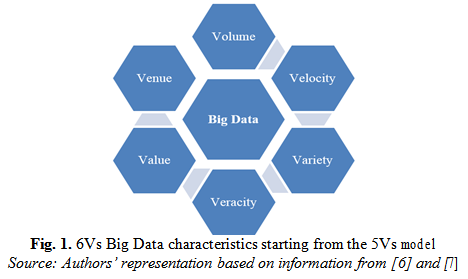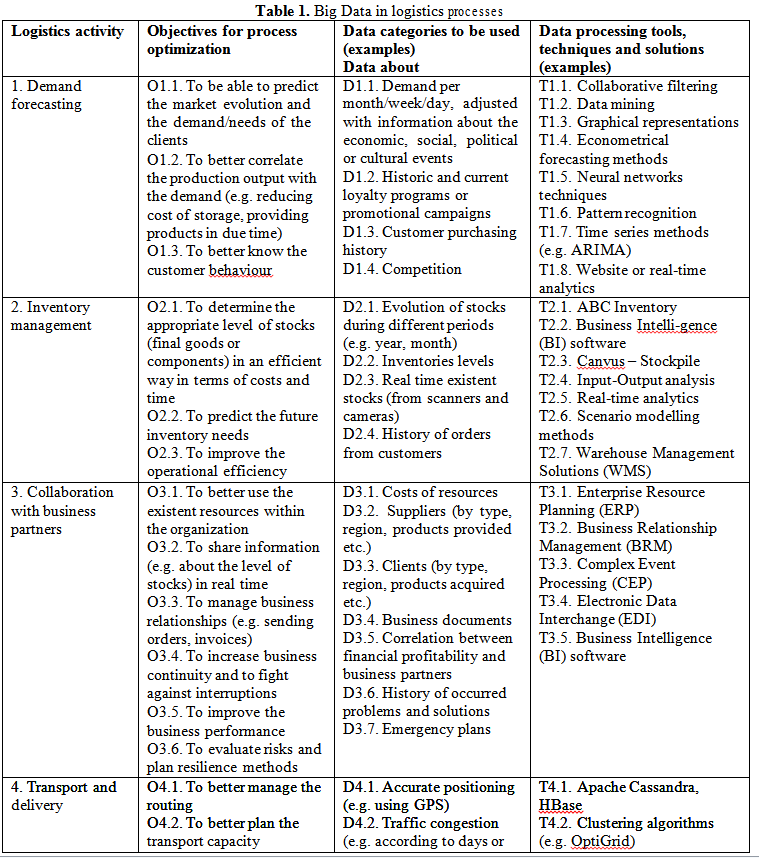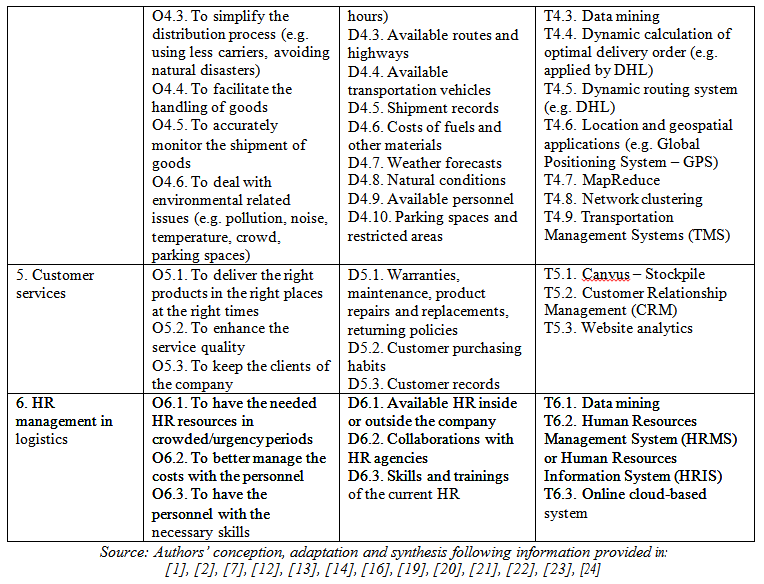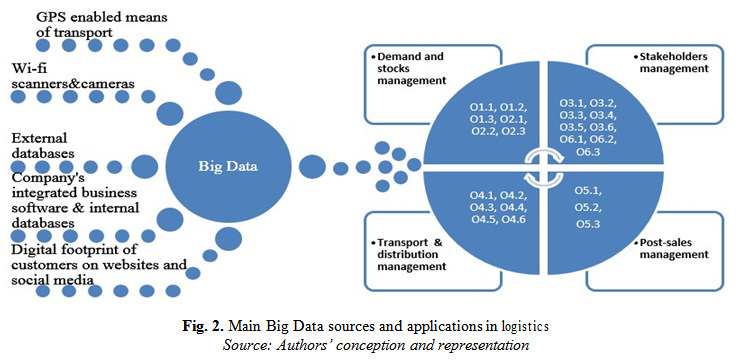Big Data Applications in Logistics: A Brief Review

Abstract
The competitive nature of the current international business environment is a driving force for new technologies development. The growing attention that was attributed to Big Data (BD) in the literature dedicated to the logistics and supply chain management fields is due to the fact that technologies based on BD applications can bring many advantages to managers, helping them take more informed strategic and operational decisions. The purpose of this paper is to concisely review the literature on Big Data and provide a few insights on its possible applications in logistics activities. As such, we conduct a review on the literature regarding the definitions and characteristics of Big Data, identifying the main challenges and benefits related to its applications in the logistics field. This research can be useful to supply chain specialists and managers who want to optimize their processes in order to minimize their costs, create a better experience for their customers and improve the collaboration with their suppliers. Our main conclusion refers to the fact that managers must recognize the importance of exploiting Big Data and transform it into valuable knowledge that can be used to increase the company’s competitiveness, but they should be also aware of the related challenges that come together with the BD advantages.
Table of Contents
1. Introduction
2. Big Data analytics – Definitions and main characteristics
3. Main benefits and challenges of using Big Data in logistics
4. Role of Big Data in logistics processes
5. Conclusions and research limitations
1. Introduction
In today’s economy, we can consider information to be the fourth production factor, alongside resources, labour and capital, and a vital factor that thoroughly influences the competitiveness of a business [1].
The concept of Internet of Things and the growing number of interconnected smart devices which collect different types of data have made available an enormous quantity of valuable information, that can be exploited to improve the operational and financial efficiency of a company, but also it can set the basis for new cooperation across the logistics chains of different businesses.
Logistics is one of the sectors that has benefited enormously from the development of Internet and the increased connectivity between different devices. RFID (Radio-Frequency Identification) & wireless communication technologies and sensor networks are now a crucial part of most logistics processes. Big Data (BD) has revolutionised the way many activities are carried out nowadays and logistics is one of the industries in which BD exploitation has an incredible potential [2]. Big Data is a game-changing trend for the logistics sector [1], as the massive data streams available from all the interconnected devices from vehicles, warehouses, traffic management systems and client’s databases represent a valuable resource that can provide reliable information for forecasts and strategic planning of future activities of the companies.
2. Big Data analytics – Definitions and main characteristics
Big Data can be defined based on large volumes of extensively varied data that are generated, stored and processed at high speed [3]. In a dedicated research, [4] estimated in 2013 that the total volume of Big Data generated daily is around 2.5 Exabytes (1 Exabyte equals 1 billion gigabytes or 10 bytes). Some of the first definitions of Big Data referred to the 3 Vs model: ‘Volume’ (large size), ‘Velocity’ (speed of transfers), and ‘Variety’ (different types) [3], as the most relevant characteristics of the investigated concept. Later research added the 4th V from ‘Value’, referring to the process of extracting meaningful information from data that was defined as Big Data Analytics [5]. Additionally, [6] developed the 5Vs model, adding ‘Veracity’ to the list of Big Data characteristics, also including the idea of validity and reliability between the defining features of BD.
The main characteristics of Big Data – including the ones contained within the 3Vs, 4Vs and 5Vs models – are presented in Fig. 1, where also ‘Venue’ (place, location) was added, following the research of [7].

Investigating the utility of Big Data for organizations, [8] identify two main characteristics that influence the possibility of creating value for the company by using BD: portability and interconnectivity. The premises for realizing value from exploiting BD refer to continuous interaction between work practices, organizational models, and stakeholders’ interests [9].
The main levels at which companies can achieve value from using Big Data are: work- practice, organizational, and supra-organizational ([10], [11], cited in [8]).
Given the large amount of data which sometimes is very different in structure and sources, the aggregating and structuring processes can be very complex, so companies need business intelligence software programs to help manage their logistics analytics [2].
Big Data can be exploited by using various types of technologies, like Hadoop, HDFS (Hadoop Distributed File System), NoSQL, MapReduce, MongoDB, Cassandra, PIG, HIVE, and HBASE that are interconnected in order to extract value from data that could not be useful without processing [12]. Frameworks have been developed for Big Data Analytics, like Apache Hadoop and Spark that use data mining techniques and machine learning algorithms; new efficient applications have been developed using libraries like, for example, Mahout and SparkMLib [6].
3. Main benefits and challenges of using Big Data in logistics
The development of Internet of Things through a variety of interconnected devices has made a large amount of data available to companies. But for these data to become meaningful information that can be properly used in decision-making processes, they need to be collected, stored, aggregated and analysed. All these processes have a high degree of complexity and pose many different challenges to companies, but the perspective of the benefits and the value that these can bring to the business is very attractive.
Regarding the logistics processes, there is a large variety of data that can be collected from GPS enabled devices and means of transportation, Wi-Fi scanners, sensors, cameras with image recognition function, digital footprint of customers on certain websites and social media platforms, clients order history, geographical repartition of clients, clients’ responses to different types of promotional campaigns etc.
According to a study conducted in 2013 [13] and related to the perceived benefits and challenges that BD brings in for different business domains, logistics managers considered real-time monitoring of shipments and inventory among the most important benefits of exploiting Big Data. Other important applications of analysing Big Data (by using BDBA – Big Data Business Analytics techniques) in logistics refer to identifying market trends, customer preferences and buying habits, as well as information that can be useful in strategic and operational decisions for a company [14].
According to [13], the biggest challenges for BD in logistics were recognized to be keeping data security and identifying the useful data for various business decisions. Other challenges are related to characteristics of data: scalability, availability, integrity, quality, origin or source, traceability, heterogeneity, bias, privacy, and legal issues [5]. Depending on these characteristics of data, the management of large volumes of information includes processes like integration of data from various sources, data matching and transformation. The complexity of the process also depends on the availability of tools and software for an efficient analysis that brings valuable information to the company.
As previously emphasized, the rapid development in nowadays technologies related to cloud storage and artificial intelligence is an important factor that improves the quality of data stored, makes it more accessible and automates a big part of the analysing process. As a consequence, the results are easier to interpret and to use in forecasts needed for logistics processes optimization. However, several studies point out the reverse side of such availability of information grouped under the Big Data syntagma.
As [15] emphasize, there is a large volume of information, which many companies in the supply chain management and logistics field are attempting to use for their benefit. As all companies have very high expectations from Big Data Analytics, unveiling the true value of these pieces of information can prove rather difficult for unexperienced economic agents [16]. Under these circumstances, [17] actually reported that business organizations gather more data than they know what to do with, while [16] consider that failure to adapt to such rapid and high volumes of information could lead to irrelevance.
The issue was also addressed by [18], by citing several studies leading to the conclusion that a growing number of companies and organizations are implementing Big Data analytics, but they are not automatically gaining competitive advantage. The author also highlights the fact that consumers’ needs and expectations have changed during the past decades, as companies are now addressing to the always-online type of customer.
Therefore, the Big Data system and the logistics supply chains must also change and adapt in order to keep up with competitors in fulfilling consumers’ demand. Hence, logistics supply chains are transforming into demand networks, which, when combined with BD initiatives, have the potential to support firms in offering what they think their customers might possibly wish to purchase, considering their integrated profile data, buying history or other personal features that result from structured data (clients databases, profile logins, etc.) or unstructured data (Facebook posts, tweets, blog posts, etc.) [18]. Sustaining this statement, [16] argue that to succeed in employing Big Data as a competitive advantage, a company needs to take the data into consideration as a long-term strategic asset, rather than as an information asset.
4. Role of Big Data in logistics processes
The inclusion of information technologies (IT) into the management of business processes shows that Big Data (BD) has a decisive role in each stage of the logistics or supply chain associated activities. Even more, especially when investigating the companies that have a large number of different customers around the country/world, the logistics activities are nowadays intimately related to BD analytics. Without intending to provide an exhaustive image of the broad application of BD in logistics, Table 1 illustrates a series of business objectives to be better achieved through application of BD in logistics, types of data, and processing tools and techniques for BD analytics in logistics processes (these are only some examples, but companies also apply customized business solutions).


Considering the logistics activities and their related objectives from Table 1 and the fact that processing a large amount of relevant data can improve their accomplishment, Fig. 2 proposes a framework for synthesizing the most important Big Data sources for applications in logistics, in correspondence with the above-mentioned business goals.

5. Conclusions and research limitations
In today’s competitive business environment all companies seek ways for improving their products and services, in order to attract more clients and increase their market share. The emergence of technologies related to utilizing Big Data at the beginning of this century showed a great potential for assisting companies with their strategic goals of improving efficiency and optimizing costs and processes.
There has been a lot of research dedicated to exploring the applications of Big Data in all economic, social and political fields. In the logistics industry, applications for Big Data are not only possible through new technologies (GPS, RFID, Wi-Fi cameras and scanners, sensor networks, Internet of Things, machine learning algorithms, artificial intelligence etc.), but they can bring a lot of benefits in terms of real-time monitoring of shipments and inventories, identifying market trends, recognizing customer preferences and their corresponding buying habits, information that can be useful in strategic and operational decisions at organizational level.
On the other hand, in the processes of collecting, aggregating, structuring and analysing different types of data, the management of vast volumes of data also poses major challenges for companies (like data usefulness, efficiency and suitability related problems), in order to generate valuable information for the future development of the business.
Our study can be useful for logistics managers and specialists, as it synthetizes the main objectives that can be achieved for different logistics activities, indicating the main Big Data categories and tools, techniques and solutions that can be applied in order to achieve them.
As for the limitations of our study, we must mention that our research is not exhaustive; we consider that the subject is extremely wide and although we identified a relevant set of studies that helped us gain insights in the field of Big Data applications in logistics, there are certainly additional characteristics, benefits and challenges to be further studied.
Our main conclusion is that the technology related applications for the logistics industry have changed the way many business processes are conducted, increasing the efficiency of procurement, storage, production and delivery activities, as well as improving customer services. Managers must recognize the importance of exploiting Big Data and transform it into valuable knowledge that can be used to increase the company’s competitiveness.
Contributo selezionato da Filodiritto tra quelli pubblicati nei Proceedings “International E-Conference Enterprises in the Global Economy - 2018”
Per acquistare i Proceedings clicca qui:
https://www.filodiritto.com/proceedings
Contribution selected by Filodiritto among those published in the Proceedings “International E-Conference Enterprises in the Global Economy - 2018”
To buy the Proceedings click here:



